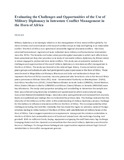| dc.contributor.author | Imbiakha, Charles Okongo | |
| dc.contributor.author | Okoth, Pontian Godfrey | |
| dc.contributor.author | Were, Edmond Maloba | |
| dc.date.accessioned | 2021-12-14T11:57:56Z | |
| dc.date.available | 2021-12-14T11:57:56Z | |
| dc.date.issued | 2021-03-22 | |
| dc.identifier.uri | https://doi.org/10.18535/ijsrm/v9i3.sh04 | |
| dc.identifier.uri | https://www.ijsrm.in/index.php/ijsrm/article/view/2972 | |
| dc.identifier.uri | http://ir-library.mmust.ac.ke:8080/xmlui/handle/123456789/1818 | |
| dc.description.abstract | Military diplomacy is increasingly relied on in the management of intra state conflicts globally. Far more common and controversial is the issue of combat troops to help end fighting in an intractable conflict. The Horn of Africa is an epitome of intractable regional intrastate conflicts that have attracted international, regional and even individual state military and humanitarian intervention since the 1970s. The Somalia and Sudan crises provide typical examples in which such efforts have been witnessed yet they also provide a case study of successful military diplomacy by African states in states engaged in protracted intra-state conflicts. This study was conceived to evaluate the challenges and opportunities of the use of military diplomacy in intrastate conflict management in the Horn of Africa. The study was located in the rational logic theory. It was carried out among peace groups and individuals who had participated in peace processes in the Horn of Africa. These were located in Mogadishu and Kismayu, Khartoum and Juba and embassies in Kenya that represent the Horn of Africa countries. Security personnel who have had a role in the Horn of Africa peace processes at African Union (AU), Inter - Governmental Authority on Development (IGAD), East Africa Standby Force (EASF), United Nations Mission in South Sudan (UNMISS), United Nations Africa (Union) Mission in Darfur (UNAMID) and African (Union) Mission in Somalia (AMISOM) were key informants. The study used purposive sampling and snowballing to determine the sample size. Data was collected using interview schedules and questionnaires which were analyzed using Concurrent Nested (Embedded) Design. Secondary data were gathered and reviewed from Journals, books and published proceedings that corroborated the primary data. The findings indicate that the obscurity of the military and the rubric in the understanding of military diplomacy poses a challenge for the military to influence intrastate conflicts in the Horn of Africa. This is compounded by other challenges including the Cold War mentality that has made the region to witness a series of foreign activities leading to militarization of the Horn of Africa with establishment of military bases in the Horn of Africa. Peace support operations are expensive to manage yet the missions undertaken in the Horn of Africa lack sustainable source of funds and instead over rely on foreign funding and goodwill. With no sufficient funds, buying equipment and paying the staff becomes a big challenge. Emerging threats and clan dynamics are actualities that the use of military diplomacy was found to face as a challenge. To change these challenges into opportunities requires rational logic from all stakeholders in the conflict management process | en_US |
| dc.language.iso | en | en_US |
| dc.publisher | International journal of scientific research and management | en_US |
| dc.subject | Evaluating, Challenges, Opportunities , Use ,Military, Diplomacy, Intrastate, Conflict, Management, Horn, Africa | en_US |
| dc.title | Evaluating the Challenges and Opportunities of the Use of Military Diplomacy in Intrastate Conflict Management in the Horn of Africa | en_US |
| dc.type | Article | en_US |

